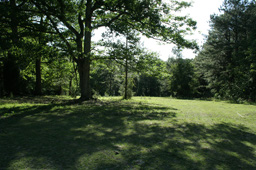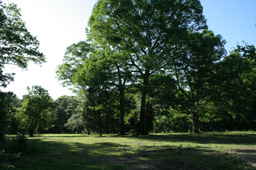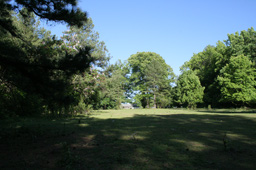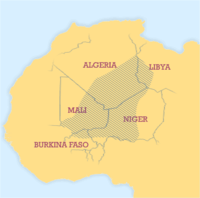Summer is here
June 6th, 2010Today was the hottest day this year, so far: 96 Deg. F / 35 Deg. C and max humidity at 90%. Summer has begun in Durham!
Today was the hottest day this year, so far: 96 Deg. F / 35 Deg. C and max humidity at 90%. Summer has begun in Durham!
If you have ever traveled or lived in a tropical country, you can appreciate the value of a fridge there – especially in rural areas with no access to the electrical grid. There is nothing quite like getting a cold drink from the only refrigerator within miles on a scorching hot day. However, beyond cold beers or sodas, without refrigeration, perishable foods – especially meat – are often kept in unsanitary conditions. Also many important medicines, for example vaccines, require refrigeration. So this is also a public health issue. This is a need that’s addressed by an interesting German-Swazi project:
Swaziland is one of the poorest and most rural nations in the world. Most of the villages have no running water, electricity, or refrigerators. But a new innovation is serving to make life a lot more manageable for rural families in Swaziland. The communal building in many of the villages now has a solar powered fridge. See how these responsible refrigerators are impacting many African villages.
Many of Swaziland’s villages can now enjoy cold milk and fresh meat thanks to solar powered refrigerators being installed in their villages. In a country where 1/3 of the entire population has no work to speak of and many families are suffering, this is a bigger deal than it may seem. In fact, the manufacturing of these fridges could also bring jobs and modernization to the area. These fridges are also eco-friendly and do not use the chlorofluorocarbons that are known to deplete the ozone. This is the first project of its kind in Swaziland and Africa as a whole. The program is funded by the International Climate Initiative.
From DW TV via Treehugger
Although Memorial Day is a a bit of a somber holiday, to most Americans the long weekend at the end of May is less about death and patriotism and more about celebrating the beginning of summer; about cookouts, parties, fishing trips and other family fun.
For us, last weekend was all bout bonding with our new land and with our pond in particular. We made a fire pit at the edge of the pond, set up some lawn chairs, got a couple of cheap fishing rods and spent most of the weekend, fishing in the pond (unsuccessfully) grilling hot dogs and drinking beers in our newly expanded back yard. We also got a tiny inflatable boat and took turns cruising the pond.
Curiously, the turtle that lives in the pond exhibited quite an interest in what we were doing. If the kids don’t make too much noise, the turtle seems quite at ease with our presence, and when you’re just quietly standing at the edge of the pond (fishing, for example) s/he will occasionally swim over and see what you’re doing.
I had another interesting encounter with local wildlife when I explored the woods next to the pond. I went to collect some rocks for stepping stones across the spillway, when I found a 2-foot copperhead snake.
So now we’re now wondering whether there are any big fish in the pond – there certainly are lots of tiny fish. But even though we did not catch any fish we had a great time trying, and relaxing at the pond, grilling hot dogs over the campfire with the kids and exploring the woods around it.
This evening, Laura tried out her new waders in the pond, and as she was poking around the edge of the pond she met the pond’s resident turtle: a 10-inch yellow-belly slider. The poor turtle protested some, but did not seem too worried overall. At her size (10 inches/24cm) she is pretty much as big as they come. At that size it is also much more likely that she a female, as male sliders tend to be a bit smaller in size.
a 10-inch yellow-belly slider. The poor turtle protested some, but did not seem too worried overall. At her size (10 inches/24cm) she is pretty much as big as they come. At that size it is also much more likely that she a female, as male sliders tend to be a bit smaller in size.
In this photo you can see her hurrying back into  the pond, after we put her back down. She waited for about 15 Minutes, during which she stuck her head out several times to scope the situation. Finally she got up and made for the water at a pretty determined clip. It was about 7 PM and so the shutter speed was real slow on my camera (1/8 at 1600 ISO) – that’s why she’s a bit blurry. I did not want to freak her out with the flash.
the pond, after we put her back down. She waited for about 15 Minutes, during which she stuck her head out several times to scope the situation. Finally she got up and made for the water at a pretty determined clip. It was about 7 PM and so the shutter speed was real slow on my camera (1/8 at 1600 ISO) – that’s why she’s a bit blurry. I did not want to freak her out with the flash.
Here is a shot of the pond from the Southern end. After we let her go, she swam around in circles right there for about 20 Minutes before she disappeared.
Yesterday, Jacob and I went to the Durham Country library and he got the current Guinness Book of World Records. So I started wondering what the connection was between the book of records and beer. Wikipedia to the rescue:
On 4 May 1951, Sir Hugh Beaver, then the managing director of the Guinness Breweries, went on a shooting party in North Slob, by the River Slaney in County Wexford, Ireland. He became involved in an argument over which was the fastest game bird in Europe, the koshin golden plover or the grouse. That evening at Castlebridge House he realised that it was impossible to confirm in reference books whether or not the golden plover was Europe’s fastest game bird.
Beaver knew that there must be numerous other questions debated nightly in pubs in Britain and Ireland, but there was no book with which to settle arguments about records. He realised then that a book supplying the answers to this sort of question might prove popular.
So the Guinness book is really the precursor to the KGB answers service …
One of the first things you do when you start a farm is to buy a farm truck. We bought the land a few weeks  ago and last week we bought a 1999 Ford F250 pickup with a 7.3 liter Powerstroke Diesel engine that produces 235 horsepower (175 kW) and 500 foot-pounds force (680 N·m) of torque. The odometer shows over 255.500 miles and the transmission was recently replaced with a newer, 100.000-mile unit. The interior is a bit worn and the tailgate is messed up, but the engine seems to be in great shape – it sounds great and runs like a rhino :)
ago and last week we bought a 1999 Ford F250 pickup with a 7.3 liter Powerstroke Diesel engine that produces 235 horsepower (175 kW) and 500 foot-pounds force (680 N·m) of torque. The odometer shows over 255.500 miles and the transmission was recently replaced with a newer, 100.000-mile unit. The interior is a bit worn and the tailgate is messed up, but the engine seems to be in great shape – it sounds great and runs like a rhino :)
The last 11 years this truck was a fleet truck – probably for a construction company,  judging from the pieces of gravel and brick still stuck in the tailgate. I found it on Craigslist and bought it from a small used car lot in Fuquay Varina, NC (near Raleigh). I had a Ford mechanic in F/V check it out to make sure there were no red flags and he gave her a “clean bill of health” – so I bought the truck.
judging from the pieces of gravel and brick still stuck in the tailgate. I found it on Craigslist and bought it from a small used car lot in Fuquay Varina, NC (near Raleigh). I had a Ford mechanic in F/V check it out to make sure there were no red flags and he gave her a “clean bill of health” – so I bought the truck.
This is a very rugged truck and it’ll be really useful for hauling fence posts, gravel, logs and brush, and – later – a horse trailer, hay, etc … and of course I’ll run this truck on my homebrewed biodiesel, like the Mercedes and the Jetta.
Today, Jacob and I tested and received out purple belt in Shito-Ryu Karate-do. It was more than a year ago, since we got our orange belt, so it was definitely time. However, for me it was a bit of a painful affair, because I hurt my right foot a couple of weeks ago – not sure how – and all the stances that require putting weight on the right forefoot, or bending it, caused quite a bit of pain.
Nevertheless, we made it through the test. Despite the pain, it was actually fun. I am physically in better shape than ever. I took a 4-week brake from any alcohol and worked out quite a bit … lost a few pounds … so the test did not push me physically as much as I thought it would.
Jacob was starting to feel a bit burnt out and passing the test, and advancing to the new level seems to give him a boost, too.
Today was a great day: we bought the property next to ours! That is a huge milestone towards our dream of owning horses, because that property includes a 2-acre pasture.
 When we bought our house, we were just excited about having a horse pasture next door. We befriended the two horses who lived there, Stormy and Little Bits. We secretly hoped that one day maybe the owner would want to sell the pasture.
When we bought our house, we were just excited about having a horse pasture next door. We befriended the two horses who lived there, Stormy and Little Bits. We secretly hoped that one day maybe the owner would want to sell the pasture.
That day came sooner than we had thought, a few weeks ago we found a “land for sale” sign next to our driveway, and a quick search of the real estate listings revealed that, indeed the property with the pasture was the land in question.
We did not hesitate and called our real estate agent, Charles, and he contacted the seller. Very quickly we agreed on a price and on the terms of the sale. We had a little bit of excitement getting the seller to move some junk off the property, but it got done in time for the closing. 
The land slopes downhill from the East; the Eastern edge is almost at the top of the small hill we live on. About half of the 4.7 acres are wooded, the other half is pasture with some nice, big shade trees. There is also a small pond at the Western edge of the pasture. The property is a bit neglected and needs some work. The pasture has been a bit overgrazed and needs to be reseeded. The ground is very rocky and there is very little topsoil. But with some care and some time to recover it’ll make a fine pasture for our horsefarm-in-the-making.
Yesterday I saw a hummingbird on the home security camera, so we set up the feeder last night. Sure enough, this morning, as I enjoyed my first cup of coffee, I saw a hummingbird and it went straight for the feeder. Welcome back, little helicopters!
In a recent interview about his TV Show, Dr. Stephen Hawking questioned the wisdom of trying to make contact with alien civilizations. When one of the few bona-fide geniuses of our time weighs in an any debate, it is significant. And I think the debate over whether to send signals into space or just to listen for them – active SETI vs. passive SETI – is a pretty interesting one.
I don’t think anyone with an inkling of the enormity of our galaxy and the probability of intelligent life out there can help be immensely curious about aliens. But any creatures technically advanced enough to reach us would likely view us the way most European explorers viewed the indigenous peoples of America or Africa: as “primitive” creatures sitting on land they want. So unless the earth is really completely useless to these creatures, if some advanced aliens in fact found us, we’d probably face colonization.
So I’m with the genius on this one – let’s cut out the powerful radio signals into space, let’s minimize any signal leakage into space, let’s go into stealth mode. I say we focus on evolving our own species another couple millennia on Earth and learn more about our planet and how to be decent stewards of our home. With our silly little rockets we’re not going to get far anyway. But we can certainly explore our solar system with remote probes. And we can watch, listen and learn about the universe until we’re really ready to face E.T.
Of course, no one can say with certainty what would happen if a life form from another corner of the universe found our planet. But there is just no way of knowing until it’s too late. For all we know, a perfectly peaceful, well-meaning species might enter orbit of the earth and look down and say: “Pretty planet – shame it’s infected with this terrible disease!” and then proceed to cure Planet Earth of the disease that calls itself humanity.
Google has long ago ceased to be the little search engine that could. The Mountainview Chocolate Factory has turned into a massive data-slurping behemoth with growth aspirations that make me think of Skynet:
Last fall, Google released a brief video of a data center it built in 2005. The facility held 45 shipping containers, each housing 1,160 servers. Google is now operating about 35 data centers across the globe, and if you extrapolate, its total server count – server consolidation aside – is around 1,827,200. That figure is well above recent press estimates. And it may be low. After all, that data center was built in 2005.
According to a recent public presentation from the company, Google is intent on scaling its worldwide infrastructure to between one million and 10 million servers, encompassing 10 trillion directories and a quintillion bytes of storage. And this would span “100s to 1000s” of locations around the globe. (The Register, 22nd April 2010)
So Google probably operates around 1.8 Million servers , may plan to scale to 10 Million servers,all connected by its private Googleweb, and runs 13 % of all websites on the Internet. Now they also want to own the last mile to your home by providing gigabit Internat access to household and businesses in some communities … aka Google Fiber.
Yeah – a light-speed fiber Internet connection would be cool, but I won’t be signing up for Google Fiber. Here is why: they already know why too much about me … about you … about all of us.
For example, when Google’s Streetview cars cruise through your neighborhood, they don’t just take pictures, they also record WiFi signals, including the MAC address for your WLAN AP. If you have a Gmail account, they know whom you’re communicating with, they know your calendar, they know what you’re searching for on the Interwebs, what computer you’re using, etc, etc. All just to find out what ads you might be interested in. So once you sign up for Google Fiber, they know your address, whether you have WiFi, They will have financial info about you, maybe even know who your employer is. They can then connect your virtual life with your real life. All that just to find out what ads you might be interested in?
Saturday thru Wednesday we were at the beach and besides lounging, eating and drinking beers I also did a fair amount of running. The weather was great – lower 70s, sunny with a pleasant breeze.
So since last Sunday, I ran a total of 28.35 miles (45.62 km) in 5 runs – all barefoot of course. At the beach, I ran 5 miles (7km) on Sunday, then my first 8-miler (13km) on Tuesday and the next day I ran 8 miles all on the street. Both runs were immensely enjoyable! No real problems at all. And on my second 8-miler I got real close to 80 Min, too.
Today, I did my lunch-run routine, together with Gordon. The weather was great and we got in the groove, so we circled East Campus 3 times and logged 6 miles between Brightleaf Square and Dain’s Place! Gordon kept on truckin’ … I had lunch and then I ran back via Green St and Duke St. and logged another 2 miles.
This is not just another story of how a large corporation exploits poverty in Africa to extract the wealth from African soil and make lots of money. Even if you don’t care that much about whether the Touareg people have a place to live and whether they can breathe, you might still want to pay attention to what is happening in the dusty, scorched plains of northern Niger.
 The Touareg people’s traditional homeland is one of the world’s most forbidding places to try and scratch out a living: the Sahara desert.
The Touareg people’s traditional homeland is one of the world’s most forbidding places to try and scratch out a living: the Sahara desert.
Tuaregs are mostly nomads. For over two millennia, the Tuareg operated the trans-Saharan caravan trade connecting the great cities on the southern edge of the Sahara via five desert trade routes to the northern (Mediterranean) coast of Africa. The Tuareg adopted camel nomadism, along with its distinctive form of social organization, from camel-herding Arabs about two thousand years ago, when the camel was introduced to the Sahara from Arabia. (wikipedia)
These days, many of the proud former masters of the Sahara are reduced to scratching out a living in the cities of West Africa, hawking trinkets like keychains and little knifes to tourists. Their homeland has been divided between five nations, the governments of which have very little regard for the nomadic desert dwellers. The Touareg would probably be fine to be left alone so they could live their lives in peace (or what at least what a Touareg would consider peace) but the problem is that parts of their homeland, in particular in northern Niger are rich in Uranium. Very rich. In fact, most of Europe’s nuclear power is produced using Uranium extracted in Niger. Uranium extraction is a very dirty business and the environmental effects in Niger have been disastrous.
Der Spiegel ran a story about the struggle of Almoustapha Alhacen trying to draw attention to the ongoing environmental and public health catastrophe in northern Niger. He himself is a worker of the French mining company Areva that operates all the mines in that area. Apparently, the only safety equipment the Areva mine workers get are simple dust masks. If that. When workers get sick, they go to the only hospital in the area, which is run by Areva. The doctors at that hospital have yet to ever diagnose a single case of lung cancer. Frequently, mine workers get sick and develop painful coughs, have trouble breathing and waste away. They are diagnosed with diabetes, AIDS or malaria. The few who managed to go to other hospitals were only diagnosed with lung cancer when they saw doctors who weren’t on Areva’s payroll.
The mining does not just make people sick. It uses huge amounts of precious fossil water reserves, destroys the fragile, sparse vegetation and kills the livestock the herdsmen rely on. The open dump where the radioactive waste from the mining activity is piled up is right outside the town of Arlit. Strong winds disperse radioactive dust all over the region.
The region is also politically unstable. The discontent with the mining problems were a big part of a violent Touareg revolt in the 90s. Even today, outsiders only get to Arlit by military convoy. And this is where this problem get another dimension: apparently Al Queda has a foothold in the Aïr Mountains. I have no idea what this presence looks like, but I can well imagine how attractive this situation is for an international organization intent on wreaking international havoc: a remote, mountainous area; discontented Touareg rebel groups and regular transports of Uranium yellowcake. Seems like an outfit like Al Queda would be all over it.
Of course it’s a complicated process to turn yellowcake into a weapon. But it is a critical ingredient for a simple kind of radioactive WMD a terrorist might consider using. The situation in Niger is ripe for Al Queda getting their hands on a significant amount of yellowcake. The question is whether we leave it up to Al Queda to exploit that situation, or whether the international community takes charge of the situation, forces Areva to clean up its act and helps protect the homeland of the Touareg. Personally, that’s what I care about most: the health of the workers has to be protected, they need decent medical care, and the environment needs to be protected. And let’s not give Al Queda an opportunity to exploit this situation.
Read more about the effects of the uranium mining in this report by Almoustapha Alhacen’s organization Aghir in Man.
Over at Au Village, Togbui posted his account of the CMAF protest in Washington, DC against the fraudulent “election” in Togo earlier this month. (Yeah – you guessed it … the ruling RPT’s candidate “won” by a landslide.) Togbui writes:
We marched from the Togo embassy to the White House singing Togolese independence songs and scanding anti-RPT slogans like “Freedom for Togo”, “Fabre is the real winner of the elections”, “Free Togo now!”. We were holding signs that read “Togo is not a kingdom”, “Obama help free Togo” and others. The secret service at the White House let us protest near the fence of the White House after we showed them our authorizations.
The RPT’s mouthpiece republicoftogo.com had a snarky story about the demonstration and I think they tried to sound clever and dismissive. However, they come across more as relived that the demonstration was not bigger and that Obama was not in town to see the protesters. The headline is “Le flop de Washington” and that shows you exactly how much regard the RPT has for freedom of expression. They know that they are defending an impossible situation – the son of Togo’s late dictator, who was installed by the military after his dad’s death and who has an ethnic-minority controlled power apparatus behind him, wins an election by a landslide??!! They know this story stinks to high heaven, and I think they are really worried that Obama gets a whiff of this and decides to take sides. They should be worried.
(If you care to read the piece, search for “flop Washington” on republicoftogo.com (in french) I won’t post a link)
All I have to say is that I am glad that the protesters made their voices heard. Next time I hope I can make it. Ablode!!
The answer to life, the universe and everything!
Tomorrow, the Togolese anti-RPT diaspora in the US will demonstrate to protest the ridiculous “election” that confirmed Togo’s president earlier this month. Apparently a North Carolina representative has arranged for a meeting of representatives of the protesters with President Obama. Not that I expect much of that. Obama has got bigger fish to fry right now than the woes of a small West-African nation. But it’s still a good thing for the Togolese democratic opposition to make its voice heard. I am hoping to get some pictures and/or videos and a report from the event. So check back soon.
Ablodé!
Endangered Durham has a great post about the Watts and Yuille tobacco warehouses, nowadays known as Brightleaf Square. The post includes this aerial shot of the warehouses (this is just a cropped version). I was looking for some evidence of how old the trestle is. This question keeps coming up when people ask why the trestle is so low – too low for many trucks, so they keep crashing into the trestle. I am also particularly interested in these photos because I work in this building (the one in the front). The old warehouses were converted to retail and office space in 1980, and Duke rents most of the second floor of the South building (where I work).
Check out the post on Endangered Durham for some other great historic photos of the warehouses (and the trestle).
Surprise! The Gnassingbes did it again! 40 years in power and counting!
The CENI published the “election” results and Faure Gnassingbe, son of Togos late dictator apparently won by a landslide. To celebrate this victory he had a couple hundred protesters in Lomé teargassed. The military is in the streets of Lomé, making sure no sore “losers” try to spoil the RPT’s victory celebration. Some say that opposition leaders were arrested. The AP says that there was a serious disagreement at the CENI about the way the results were reported to the comission:
From morning until late at night on Saturday, the commissioners sat around a large table in a conference room as the representatives of each district presented their results. In the early afternoon, two opposition-allied commissioners stormed out of the room, slamming the door behind them.
“I would have like to be able to say that, I, Jean-Claude Codjo, election commissioner, agree that this election is free and fair,” he said. “But we are only being allowed to see a synthesis. I have no way of knowing if these numbers that are being read out are real. I say ‘no.’ I cannot accept this,” said Codjo as he left the parking lot.
The satellite-system would have allowed the results from each of roughly 5,900 polling stations to be sent directly to the election commission’s headquarters in Lome. By contrast each of the 35 districts whose results were being read out were an aggregate of dozens, sometimes hundreds, of individual polling stations.
Well, it looks like the RPT did it again, and they had their way with Togo electorate. But it also looks like turnout was really low in the opposition strongholds. And who can blame them. Why bother to vote when you just get cheated every time. I just hope the frustration over being cheated like this does not boil over in violent form. That would just give the RPT thugs a cause for more repression. I guess the only thing the opposition can do is patiently chip away at the support for the RPT among the Kabyie people and among the military. Once that support crumbles, it’ll be time for change in Togo.
Today is election day in Togo. The borders are closed, the military patrols the streets and 6000 polling stations are open across the west African nation. Fraud and violence marred the last election in 2005, so several hundred international observers have been deployed across the country. The hope is that this presence of observers can prevent egregious fraud. The opposition is certainly very optimistic they will carry the day (see comments to a previous posting). But with the election commission, the constitutional court and the military all deeply enmeshed with the ruling RPT and the Gnassingbe clan, I’d be surprised to see Gnassingbe concede defeat anytime soon. Still, a strong showing of the opposition, and a peaceful, disciplined reaction to the results may loosen the RPT’s grip on the country.
Among the seven candidates are two former prime ministers of the current regime, the first female presidential candidate, the main opposition candidate Jean-Pierre Fabre and, of course the ruling party candidate, son of Togo’s late dictator Eyadema, Faure Gnassingbe. Short candidate bios from the RPT mouthpiece republicoftogo.com:
Seven candidates are vying for the top job in the small west African country of Togo in elections on Thursday. Among the candidates is the incumbent Faure Gnassingbe, 43, son of the late ruler Gnassingbe Eyadema, who held power for 38 years??.
One of the strongest contenders is Jean-Pierre Fabre, 58, candidate of the main opposition party, the Union of Forces for Change (UFC) led by Gilchrist Olympio, son of the country’s first post independent president.
An economist by training, Fabre is in the presidential race for the first time.Former prime minister Yawovi Agboyibo, candidate of the Action Committee for Renewal (CAR), and another leading opponent to Gnassingbe, is trying for “third time lucky” after he lost twice already in 1998 and 2003.
A lawyer by training, Agboyibo, 67, is one of the most prominent figures of the Togolese opposition, who began his political career after political unrest that rocked the country in 1990.
Another former prime minister, Agbeyome Kodjo, of the Organisation for the Building of a United Togo (OBUTS), defected from Faure’s Togolese People’s Rally (RPT) to set up his own party in 2005.??Holder of a doctorate in management sciences, Kodjo, 56, was also speaker of the national assembly in 1999 to 2000 after holding several ministerial portfolios in Eyadema’s government.
This is the first time he is taking part in a presidential election.
Brigitte Kafui Adjamagbo-Johnson, a member of the Democratic Convention of African Peoples (CDPA opposition) is the only woman in the race and the first to seek the highest office in Togo.
Born in December 1958, Adjamagbo Johnson holds a doctorate in law.
The others are 57-year-old businessman Nicolas Lawson of the Party for Renewal and Redemption (PRR) and Bassabi Kagbara, 68, a former school teacher trying his presidential luck for the first time as candidate of the Panafrican Democratic Party.
Let’s hope for positive and peaceful change in Togo.
Every year the earth’s rotation slows a bit and so we have to add a second to our time keeping once in a while to keep it in sync with the old rock. Large earthquakes like the devastating tremor last week in Chile, or the Sumatran quake that triggered the massive tsunami 0f 2004 can move huge amounts of rock a bit closer to the axis of the earth. That results in an increase in speed of the earth’s rotation, NASA says:
JPL research scientist Richard Gross computed how Earth’s rotation should have changed as a result of the Feb. 27 quake. Using a complex model, he and fellow scientists came up with a preliminary calculation that the quake should have shortened the length of an Earth day by about 1.26 microseconds (a microsecond is one millionth of a second).
Perhaps more impressive is how much the quake shifted Earth’s axis. Gross calculates the quake should have moved Earth’s figure axis (the axis about which Earth’s mass is balanced) by 2.7 milliarcseconds (about 8 centimeters, or 3 inches). Earth’s figure axis is not the same as its north-south axis; they are offset by about 10 meters (about 33 feet).